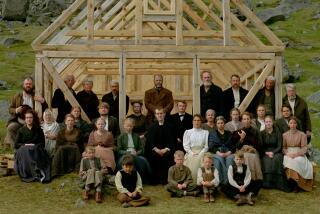Warmth in Iceland
- Share via
When Reagan and Gorbachev met in Iceland last fall, the news was their startling near-agreement or non-agreement over arms control and, later, the way this near-or-non-agreement vanished when more was learned about it. It rather resembled the unstable geography of Iceland itself, where volcanic islands suddenly appear off shore, seethe for a while, and sink back underwater.
News apart, 5,000 journalists had to find something to do, and there were quite a few stories coming back about the national characteristics of a remote and not widely known country. We read a good deal about fishing, ghosts, the simultaneous tolerance of strong spirits and prohibition of beer, and the good looks and cheerful democracy of a population consisting of 200,000 neighbors. And we heard a certain amount about culture and the high per capita consumption of poetry.
The relationship of Icelanders to their language and literature is a fascinating one, particularly to anyone whose vocation or avocation is words and their employment. I happened to have visited the place briefly a couple of months before the Reykjavik summit, or depression, and came away feeling that I had glimpsed in a uniquely pure form the ability of a national tongue to function as a national soul.
Settled in the 9th Century, Iceland--inhabitable only along the coast--was the most precarious part of the Norse world. Yet, virtually from the start, it became the scribe, the storyteller, the poet and the keeper of mythology of what today we call Scandinavia. It was Icelanders who wrote the Edda--the collected legends of the Norse gods--the Sagas--stories of history, of exploration and of exploits heroic and picaresque--and the court poetry for all the northern kingdoms.
Over centuries of decline, near-starvation and colonial submission to Denmark, this isolated outpost kept a sense of its identity as the voice in rags of a great civilization. It was Scandinavia’s blind Homer. And today, comfortable and fairly prosperous, Iceland’s national identity still lies in the word, and in a quite individual way.
The popularity of poetry there is evident. W. H. Auden remarked on it when he visited in the 1930s. Marshall Brement, a recent U.S. ambassador, cites an incident in a Halldor Laxness novel in his introduction to a book of translation from three Icelandic poets. (Brement’s introduction, that is; and Brement’s translation. In Iceland, even American ambassadors can fall into literature.)
Laxness wrote of a poet who is jailed for statutory rape. The other inmates--murderers and thieves--come up and ask him to recite his work. First of all, he has to listen to theirs, though; and sure enough, they have all written some. Sigurdur Magnusson, a leading novelist, told me that at a meeting to discuss his writing, the audience included a policeman, a fisherman and several taxi drivers. After subjecting his work to thorough analysis, they went on to discuss new trends in Icelandic poetry.
And when Reykjavik’s town poet, Tomas Gudmundsson, goes for a walk downtown, he meets himself in stone on a busy intersection. His statue--a non-representational granite column--stands on Austurstraeti with one of Gudmundsson’s poems inscribed on its side. It is a song to his youth, to the city he knew when young, to girls no longer young. “Where are you Austurstraeti’s daughters, with your joyous countenances and narrow feet?”
What we remember, we do not lose. Icelandic poetry is notable, not so much in its prevalence as in being part of a larger phenomenon. It consists of keeping the past alive while trying to live in the present. Nowhere in the world, perhaps, is one made aware so visibly and explicitly of the links between poetry, language, history and national character.
Icelandic today is, with no great changes, the language spoken 1,000 years ago. Swedish, Norwegian have all evolved; Icelandic remains essentially the Old Norse they evolved from. The careful guarding of the language is in the hands of an official commission that devises words for new concepts and inventions in such a way as to preserve a linguistic link with the old tongue.
The word for computer combines a root meaning “number” with an old word meaning “seeress.” “Software” and “hardware” are put together, respectively, from “mind tool” and “machine tool.” A television screen, skjar was the word for the translucent sheep placenta that country cottages once used as window panes. The commission must have enjoyed that one.
And when AIDS came along not long ago, it was possible to see, in this volcanic country, how language is born in struggle, how naming can be governing, how an attitude can be codified into a word. A right-wing newspaper uses Eydri, meaning “total destruction”; a progressive paper uses alnaemi, meaning “total vulnerability.” The commission has not yet made up its mind.
Does all this seem quaint, impractical and even stuffy? Probably it is a bit of all three. But look a little further, and you will see a real human option in it. It is not our option nor that of most of the world, but there is a fundamental seriousness, even grandeur, to it. What it means is that Icelandic schoolchildren today can read the literature that established their country’s unique character almost as if it were their present every-day language. It is as if our own children could read not merely Shakespeare, but Chaucer and Beowulf, as well, in the original.
“You must understand,” Jon Hilmar Jonsson, a member of the language commission, told me. “Our sagas are our identity. Not to be able to read them would be to forfeit it. And if their language is no longer our language, people will lose this ability.”
And so we have a people that, at undoubted cost and with considerable difficulty, has decided that to be itself it must hold onto its verbal and literary memory. What does it mean, then, to have chosen to make an old epic cast of mind part of a mentality that is as modern, up-to-date and in most respects as sophisticated as that in any place in Europe?
I went one day during my visit to talk to Jonas Kristjansson, director of the Arni Majnusson Institute, which houses Iceland’s treasury of old manuscripts. Kristjansson, one of the country’s leading experts on the sagas, is a slender, wiry man with white hair, a prowlike nose and dreamy blue eyes. In his office, there are 24 brown cloth volumes containing a modern edition of the entire saga literature. They are as burnished with intelligent use as an old fiddle; they seemed sentient; and whenever Kristjansson leaped from his sofa to document a point, the right volume seemed to jump out even as he swooped up at it.
I asked him what it was like for Icelanders to be brought up with 1,000-year-old voices telling them directly, without translation or adaptation, stories of prowess, passion and a millennial way of looking at the world. What was it like to have Snorri, Njall, Melkorka, Gudrun and other prodigious saga figures speaking their same language while saying such different things? Did they live to some extent in the Icelandic consciousness the way that Hamlet, Joseph K, Robert Jordan or Holden Caulfield might be said, in some fashion, to live in ours?
Kristjansson thought that they might. He recalled that in the Heimskringla saga, the Vikings swore to fight Haakon of Norway, and each set his right foot upon an oak stump to seal this unbreakable resolution. In fact, they lost, ran away, and some came to settle in Iceland. And at the beginning of this century, a group of young nationalists repeated the foot-on-oak ceremony, each swearing an oath of his own.
“One of them swore he would win the wrestling games at Thingvellir,” Kristjansson said. “Actually he lost, though later he wandered around Europe putting on wrestling exhibitions for money. In Russia, he even wrestled a bear. Finally he came home, built the Borg Hotel downtown, and got rich.”
There did seem to be an unbroken quality--a balance of solemn resolve and comical adaptability--from Heimskringla to the hotel keeper in Kristjansson’s drolly told account. And from there to some of the Icelanders I met in my visit. I remember evenings of talk that mingled fierce arguments with a tolerant, almost jovial self-mockery. I didn’t see anyone put a foot up to swear anything, but I did meet a man who left a promisingly convivial dinner early because he had sworn to his wife that he wouldn’t drink after 8 o’clock. She was away, and there was no one waiting for him at home, but he had made a promise. It’s also true that around 11, he came back, arguing loneliness.
The Icelandic word is important, supremely important, even if like mortality itself, it doesn’t quite command reality. One of the most celebrated moments in the sagas comes when Snorri, receiving a fatal sword thrust, cries out: “This shall not be”--death, that is--and immediately dies.
More to Read
Sign up for Essential California
The most important California stories and recommendations in your inbox every morning.
You may occasionally receive promotional content from the Los Angeles Times.













